|
Nigeria Economy - Development | Human rights Nigeria's oil capital "evicts 200,000"
Amnesty International today released a 44-page report, documenting the large-scale demolition of poor residents' homes in Port Harcourt. Without prior notice and without compensation, poor city dwellers are evicted from their homes in a long-term drive to develop the rich city.
In August 2009, Njemanze, a waterfront settlement, was demolished as part of the urban renewal plan. It is estimated that over 13,000 people were forcibly evicted without adequate notice. "They lost their homes and, in many cases, their possessions and livelihoods. One year on, many still have nowhere to live," according to the Amnesty report. The human rights group questions the legality of the whole process and its total lack of transparency. "No public consultations were carried out before or during the development of the Port Harcourt master plan," according to Amnesty. A Nigerian developer told the human rights group that "the Greater Port Harcourt Master Plan is a standard town planning manual. Although it runs to four volumes, there are few specifics. No in-depth socioeconomic study was done. Ideally it should have taken a couple of years. There should have been a household survey, a social survey." The vacated lands are taken over by the Rivers State government, without any compensation, which again leases out the land to prospectors. In one of the few documented state-prospector agreements, government agrees to ensure "peaceful evacuation and relocation of present occupants." It also states that the Rivers State government will ensure neat surroundings within
A Nigerian developer told the human rights activists that prospectors and state authorities engage in profit sharing agreements once the land has been developed. "The government provides land and the private developer provides money. The government's part of the deal is to ensure the land is unoccupied and unencumbered. Once the government has done that, [the project] gets developed and [the government and the company] share the profits," he told Amnesty. "Ordinarily, public private partnership is not a problem, it happens all over the world, but the duty of care is missing here," the developer added. According to Amnesty, the Master Plan includes vast parts of Port Harcourt's residential areas, especially the city's many informal settlements. If the Master Plan is concluded, at least 200,000 citizens will be evicted. Since 2009, massive protest action has somewhat slowed down the progress. "These planned demolitions are likely to plunge hundreds of thousands of Nigeria's most vulnerable citizens further into poverty," said Amnesty's Tawanda Hondora. "The government should halt the waterfront evictions until they ensure they comply with international human rights standards," she urged. Amnesty also stated concern about "the excessive use of force," including the unlawful use of firearms, displayed by security forces while undertaking forced evictions. In October 2009 at least 12 people were shot and seriously injured, and one killed, on Bundu waterfront when armed security forces opened fire on a crowd protesting planned demolitions there. By staff writer © afrol News - Create an e-mail alert for Nigeria news - Create an e-mail alert for Economy - Development news - Create an e-mail alert for Human rights news
On the Afrol News front page now
|
front page
| news
| countries
| archive
| currencies
| news alerts login
| about afrol News
| contact
| advertise
| español
©
afrol News.
Reproducing or buying afrol News' articles.
You can contact us at mail@afrol.com










